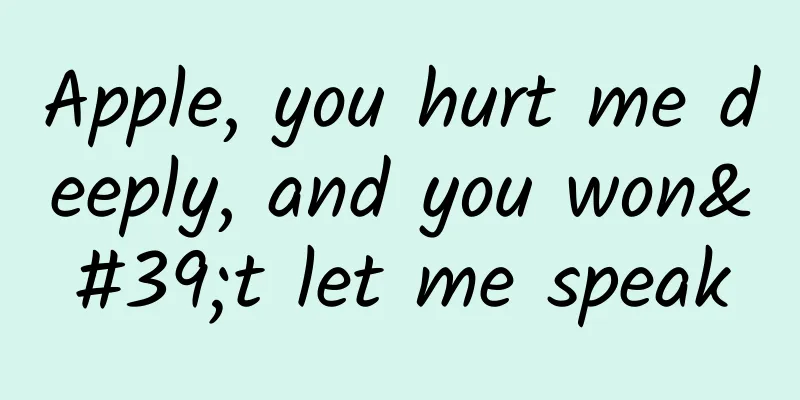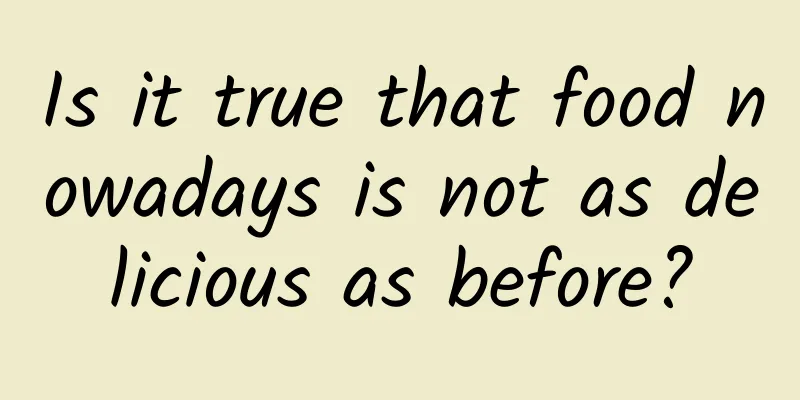Apple, you hurt me deeply, and you won't let me speak

|
Apple claims that its process for reviewing apps is designed to "ensure they are reliable, work as expected, and don't contain offensive content." But in reality, the process is slow and authoritarian. Generally speaking, it is unlikely that the review process will not take you 7 days, and sometimes even several weeks. If there is a need to communicate back and forth with the developer on the review rules, it will take longer. This result reveals to some extent that the rules set by Apple are ambiguous and too broad. Some seemingly completely reasonable applications may eventually fail the review and not be approved. This inefficient and low-quality application review mechanism is causing harm to users and developers. Two harms caused by inefficient review speed Slow review will in turn damage the reliability of the application. In the real world, it is impossible for developers to conduct exhaustive testing of all boundary conditions that may cause the application to crash. Fortunately, once an application is released to the market, we can get feedback from end users. But when we solve the problem based on user feedback, the solved version needs to be dormant in the queue waiting for review for at least a week. The end users of the application spent several weeks fighting with the old version of the application with problems. It was not easy for the developer to solve the problem, but the new version was detained by Apple on the grounds of reliability check. Although Apple provides a patch review process specifically for new modifications, this also only brings more frustration to their users, because even if only a new feature is added, the review time required will basically exceed a day. One could argue that if developers knew how long they would have to wait before their changes were released, they would be more careful about making those changes to ensure they were correct. This may be true to some extent, but since there is no such thing as bug-free software, it should be clear that the more cautious you are about a change, the more likely it is that another problem will arise. The slow review process slows down the pace of innovation. The mainstream websites we see today basically release some small updates every one or two days, which is a reflection of efficiency and rapid adjustment and adaptation. On the other hand, Apple drags all the companies and developers who develop software on its platform into its big and comprehensive release style that is still in the 90s, making the rapid iteration that is popular today impossible. If all websites have only 1/7 or 1/14 of the normal iteration speed like Apple, then is it possible for your favorite website to develop into what it is today? Special audit rules make the situation worse Apple considers itself the arbiter of taste and opinion. Imagine if you were to buy a car and they told you that you were not allowed to drive it to a strip club, or if you were to buy a TV and they said they were not allowed to play Fox News. Now you realize that we are also following the rules imposed on us by a company that has 40 percent of the market share, right? I accidentally chose Apple's mobile phone platform because of its excellent camera function, which means that you will be completely imprisoned in the opinions imposed on you by the other party. We all have parents, and we all have the right to vote with our feet, but Apple has overridden all the rights mentioned above with the rule of "rejecting applications that have avatars that ridicule public figures or overly expose skin", and it also calls it to protect users. In addition, Apple has some other similar clauses, such as the application cannot have recruitment themes, cannot have information about legal marijuana, cannot have gun pictures, cannot have search engines, and does not accept Drones applications (Editor's note: Apple's rejection of Drones applications is not an overnight thing. Those who are interested can read this article). Jobs once argued that he was offering us true freedom, freedom from pornography. Apple declared: "If you want to judge a religion, write a book. If you want to write about sex, write a book or a song or a medical app. It can be complex, but we've decided that certain types of content shouldn't be allowed in the App Store... We will reject any app that has content or behavior that crosses the line." But you have to know that applications are a very powerful form of communication for contemporary humans, and as developers of these applications, we should have enough freedom to express our views. Apple's review rules put Apple above its users. The best example here is the restrictions on in-app purchases. Apple must have been blinded by money, and it banned the in-app purchase feature because it could not share 30% of the revenue. As a result, users cannot buy books on the Kindle app, videos on the Youtube app, or comics on the comics app, while these features are completely fine on Android. In the early days of the Apple App Store, Apple refused to include an app simply because it competed with Apple's own built-in apps. Apple's attitude problem is well known. For example, it described the fact that it took a share of the apps sold by developers as "Apple pays developers", but in fact it should be "Developers earn income through their own labor, and Apple takes a piece of it." Apple's review is too subjective and weak in enforcement. It is inevitable that a software will have many problems from the first version, so we need to constantly solve the problems and quickly iterate and release them. However, the reviewer may reject your app because he cannot understand your app from his professional perspective, or suddenly notify you that you need to add some additional statements, or reject your app because you do not follow the calling method of Apple's TouchID API. These rules are so vague: apps in the store must be bug-free, cannot have hidden functions, and must have lasting value - this kind of general talk is equivalent to covering everything in one fell swoop, leaving it to Apple to judge. Apple's appeal process is also slow and full of uncertainties, so developers can only wait and pray. Looking around, the Apple Store is still full of buggy and unsafe apps. If Apple's review really requires bug-free apps, isn't this just a slap in the face? What are your review standards? Apple's answer in their review terms is this vague: "When you touch nature, you will know where our standards are." The reason why Apple was able to exist and develop in the first place was that its founder grew up in a world where "any developer anywhere can write applications for any user anywhere", and there was no need for a matchmaker to connect developers and users. Do you remember the famous Apple commercial in 1984, how Apple claimed to be the voice of freedom? But now you can see that Apple is on the opposite side of freedom, on the side of control, and strongly promotes totalitarianism to restrict users to use their devices within its rules and regulations. Anyone who has participated in a hackathon should have encountered this situation. After the marathon, your application can be provided to users on the Android platform for download and use on the same day, but on the Apple iOS platform, sorry, you only have to wait a week, so if you want to participate in a hackathon, please don't consider playing on the Apple platform. So, behind Apple's smooth animations and shiny and thin appearance, I see that we are walking on a dark road of no return. Anger is justified A lot of ink has been spilled lately about other battles of control and anti-control: Amazon vs. Hachette, TimeWarner vs. CBS, Verizon vs. net neutrality, Google vs. Yelp. Now it might be time to focus on Apple, the gatekeeper to the App Store, whose only reason for closing the door to developers is out of authoritarianism and complacency, which is worse than shutting out apps because of low revenue. Many of us worry that speaking out and criticizing Apple will lead to retaliation. Incredibly, Apple actually wrote a threat like this: "If your app is rejected, you can complain to our review board. I'm telling you, bashing us in the press won't help." If Apple really penalizes developers for their public speech, who can we appeal to? And there are others who are so captivated by Apple's beauty that they can turn a blind eye to all of Apple's unreasonable offensive behavior. Improvement Suggestions Is it really that hard for Apple to use its vast resources to automate the review process, or hire more people to speed up the review process? (Look, Google has achieved near-real-time review of apps, and the world hasn't ended because of it, right?) A better approach would be for Apple to relax the restrictions on app content review. Why not let users decide for themselves whether the app is disgusting? Is the app useful? Does the app have too many bugs? Instead of Apple volunteering to be our babysitter. Another point is that Apple whitelists its own apps and puts them in a prominent position so that users can find them as quickly as possible, while apps written by us developers must be found by users searching or linking. Consider further supplementing and improving TestFlight so that everyone can more conveniently release beta versions of applications without affecting the normal review process, so that users do not need to wait for a long review process every time before they can get the beta version of the application to experience it. In fact, a similar approach has been provided to users without a doubt in the early days of Android. Besides, I can’t give any other more specific solutions now. But the problem is in front of us, and I hope Apple and everyone will work together to solve the problem. Sometimes I even hope that all mainstream app developers will unite and remove their apps from the Apple Store for one day to put pressure on Apple and tell Apple that the damage caused by their slow review process cannot be ignored. If I wrote this article while I was still working at the company, it would be like writing a resignation letter to the company, but now I have left the company, so my comments should not cause any harm to the previous company. As an Apple app developer, I think it is very necessary to talk about the harm that Apple's review system has brought to all of us developers, so this article was born. postscript After I posted this article on Twitter, I quickly received a lot of feedback that seemed worth discussing. Here I list some of them and respond to them one by one. 1. "The Apple Store is still very useful. Just look at the other stores that are filled with software that crashes and is malicious." Apple’s review process is certainly not without merit in protecting users and developers, but: At least based on my many years of experience in application development and use, the view that Android is flooded with apps that are prone to crashing and have malicious behavior is exaggerated. It is difficult to provide credible evidence to prove which platform's application is more stable. The current slow review process is far more than what is needed to keep the store clean and attractive. On the other hand, measures taken by other platforms such as Android, such as introducing review automation and providing whitelists for outstanding developers, are good improvements. You, Apple, can't threaten developers just because they openly criticize you. Freedom sometimes does bring more chaos than control, but don’t forget that control is only a process, and our ultimate goal is still to move towards freedom. 2. "It is the users who choose Apple products. No one is forcing them to do so with a gun." If users knew that apps in the Apple Store were not allowed to even make jokes about politicians, how many people do you think would be willing to buy iPhones based on American liberal ideas? And how many people do you think would still choose to buy iPhones after knowing that iPhones offer similar functions to other smartphones? When users choose an iPhone, they don't realize how much trouble their choice of using apps from the Apple Store will cause to developers, which in turn will ultimately have an impact on the quality of the apps used by users. 3. "It sounds like you don't really know what this is all about." Facts speak louder than words. This article is the result of my thinking during the years of developing many popular applications. You can also ask developers from other large companies to see if they have the same opinion. If you have any questions, you can go to my Twitter to read the comments. Of course, if you like, you can also comment on it. After this article was published, I received an article from a netizen titled "Apple will threaten developers who publicly criticize it" (Editor's note: I plan to provide a Chinese version of this article, please look forward to it on this site or my official account), which received the highest "Heartbreaking" rating on Hacker News: "I am a 17-year-old Apple app developer. Apple's App Store is too opaque and secretive. It's like a bottomless black hole. When I throw my app changes into it, they often sink into the sea without any response or control. Apple decides when I get paid and when my app will be uprooted overnight, and as a developer, I have no idea about it." 4. "You should be laughing at Apple for building the App Store. Without it, can your app reach so many people?" We can't just cover up all the shortcomings of the Apple Store because it does a good job in one aspect, right? Moreover, why don't you compare it with the Android Store and the Internet, which cover more users? In this case, they don't have as many rules and regulations as you do, so why don't you say anything? Finally, perhaps it is worthwhile for everyone to seriously think about what is reasonable and necessary. |
<<: Bitmap things: memory usage calculation and loading considerations
>>: The Bubble and Truth of Internet+
Recommend
What is the "foam" in the broth? If there is foam when washing beans, can I eat it?
There are many cases of food foaming in daily lif...
The dead bird was reborn as a drone, and will fly with the flock of birds. I wonder if other birds can find out that it died a long time ago...
The dead bird flapped its wings again and soared ...
Astronauts' life in space: both fun and trouble
Compared with the ground, the microgravity enviro...
Still promoting hot-selling products? An e-commerce operation plan worth collecting
Do you think I'm bragging? Let me calm down f...
SiriOS may be released soon to help Apple's smart home ecosystem
Following iOS, MacOS, watchOS and iPadOS, Apple&#...
“Zero Inventory” is achieved, JD.com builds a complete smart supply chain
[51CTO.com original article] JD.com CEO Liu Qiang...
After experiencing the growth of Bilibili from 1 to 10, I have 5 profound insights
You will find that the larger the community, the ...
Volcano also "understands" fashion! Did she "perm" herself into a big wave?
The Keluo volcanic group is located in Keluo Town...
Code practice for handling i18n international telephone area codes
Preface Last week, I was busy with the internatio...
A 3.6-magnitude earthquake occurred in Puyang, Henan! Many places in Shandong and Henan felt the earthquake. Pay attention to the following misunderstandings when avoiding earthquakes →
According to the official measurement of the Chin...
Lighthouse permissions are open, is open source technology the future of VR?
Abstract: There are many examples of open source ...
How to cold start a new consumer brand from 0 to 1
How to cold start a brand in a niche market? This...
World Drowning Prevention Day丨Can "Hanging Upside Down to Control Water" Save Drowning People? Be sure to read this comic strip before playing in the water!
The article is produced by "Science Refutes ...
How to retain users through membership system? A brief analysis of the Ele.me Super Membership Card!
As a veteran office takeout delivery buyer, I oft...
Let’s talk about user churn analysis in the simplest way
Churn analysis is not about analyzing the problem...









